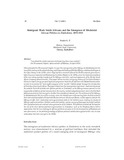Please use this identifier to cite or link to this item:
https://cris.library.msu.ac.zw//handle/11408/708| Title: | Immigrant Black South Africans and the emergence of Modernist African Politics in Zimbabwe, 1890-1940 | Authors: | Ncube, Godfrey Tabona | Keywords: | Immigrant, Black South Africans, Modernist African Politics, Zimbabwe | Issue Date: | 2013 | Publisher: | Midlands State University | Series/Report no.: | The Dyke;Vol. 7, No. 3; p.19 - 34 | Abstract: | “I am afraid the whole experiment of importing them was a mistake”.(Sir Drummond Chaplin, Administrator of Rhodesia, 14 April 1919) What prompted Sir Drummond Chaplin to regret the immigration of the Mfengu to Matabeleland at the turn of the century is the subject of a long and chequered history of British-Mfengu relations that began in the Cape Colony in the 1830s, where they had been erstwhile allies of the British colonial government, before they were imported into Rhodesia by Cecil John Rhodes in the 1890s, where the historical conditions of the new colony quickly transformed the Mfengu into bitter and vocal opponents of the British South Africa Company administration. This paper delves into this intriguing history of Cecil John Rhodes’s scheme to import a large group of ‘loyal and progressive’ black South Africans into Matabeleland as allies, in order to neutralize the ‘incorrigible savagery’ of the ‘warlike’ Ndebele people through the introduction of Christians from South Africa. This paper shows how this immigration experiment inadvertently sowed the seeds for the birth of modernist African politics in Zimbabwe, as the Mfengu became pioneers in the organization of African protest movements in the country, and later played prominent roles in the first black political movements that emerged in the first three decades of colonial rule. The settlement of the Mfengu in Matabeleland at the turn of the century, where the Ndebele were still smarting from the destruction of their state and dissatisfied with land distribution between Whites and Blacks, created opportunities for the Mfengu to offer their leadership and organizational skills to the Ndebele cause, leading to a fusion of Mfengu modernist politics, Ndebele monarchist politics, and an emerging Bulawayo township tradition that crystallized around rural and urban grievances of the Ndebele. This political cocktail laid the basis for the rise of the first African political organizations in Zimbabwe, such as the Rhodesia Bantu Voters Association, that threw a challenge to African political exclusion in the electoral politics of Rhodesia and was a forerunner, in the political genealogy of African political mobilization against settler rule, to mass nationalism that later emerged in the 1950s. | URI: | http://hdl.handle.net/11408/708 | ISSN: | 1815-9036 |
| Appears in Collections: | Research Papers |
Show full item record
Page view(s)
100
checked on Apr 9, 2025
Download(s)
36
checked on Apr 9, 2025
Google ScholarTM
Check
Items in MSUIR are protected by copyright, with all rights reserved, unless otherwise indicated.




